Physical Address
304 North Cardinal St.
Dorchester Center, MA 02124
Physical Address
304 North Cardinal St.
Dorchester Center, MA 02124

As the deadline for tax season approaches, it’s essential to understand the tax implications of your financial transactions, including those made through third-party payment apps like Venmo.
In this article, we’ll explore the taxability of personal and business transactions on Venmo and other similar apps, as well as some general things to be aware of when using these platforms.
If you’re using Venmo for personal transactions, such as splitting the bill with a friend or receiving a gift from a family member, you’ll be happy to know that these transactions are not reportable or taxable income.
The IRS is not interested in these types of exchanges between friends and family, so you can breathe a sigh of relief.
On the other hand, if you’re using Venmo for business transactions, such as running a side gig or a small business, these transactions are considered taxable income. This means that you need to report them on your income taxes every year.
For example, if you run a lawn care or pet care business on the side and receive payment through Venmo, or if you sell a product like original stationery or graphic t-shirts for a profit, these earnings must be reported on your income taxes.
When using Venmo or other third-party payment apps, it’s essential to be aware of the following:
As with any financial transaction, it’s essential to understand the tax implications of using third-party payment apps like Venmo. While personal transactions are not taxable, business transactions are, so it’s crucial to keep track of your income and report it accurately on your income taxes.
By being aware of the differences between personal and business transactions and keeping accurate records, you can ensure that you’re in compliance with IRS regulations and avoid any potential issues down the line.
As the use of third-party payment apps continues to grow, what steps can the IRS take to ensure that users are accurately reporting their income and paying their fair share of taxes?